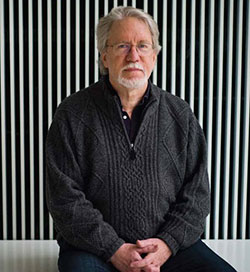Distinguished Rhetoric Scholar Edward Schiappa Speaks at Colloquium
 Edward Schiappa
Edward Schiappa
On Jan. 28, Edward Schiappa gave a lecture entitled, "In What Ways Shall We Say Mathematics is Rhetorical?" at Carnegie Mellon University. Schiappa’s talk was the first installment of this semester’s Rhetoric Colloquium Series, which brings two distinguished scholars every year to speak about their work with Department of English students and faculty.
Schiappa, professor and head of MIT’s Comparative Media Studies/Writing program, conducts research in argumentation, classical rhetoric, media influence and contemporary rhetorical theory. He’s authored ten books and his research has appeared in journals such as “Philosophy & Rhetoric,” “Quarterly Journal of Speech” and “Rhetoric Review.”
Schiappa has said if there is a domain of human inquiry that traditionally has been considered a “rhetoric-free zone”—it’s Mathematics.
“Nonetheless, part of the Rhetorical Turn of the late 20th and early 21st century includes various efforts to describe the creations of mathematicians as rhetorical,” he added.
His discussion at CMU began with a brief overview of the theoretical ideas that formed the basis for the Rhetorical Turn. The lecture had grown out of a chapter Schiappa was preparing for a collection on rhetoric and mathematics he was editing.
He then provided a combination of efforts to understand mathematics as rhetorical including ‘The Rhetoric of Mathematics,’ understood as the persuasive use of mathematics; ‘Rhetoric in Mathematics,’ known as the stylistic modes of persuasion found in written proofs throughout history; and ‘Mathematics as Rhetorical,’ an approach inspired by Thomas S. Kuhn’s writing that stresses the powerful role of figuration in thought and language. It also describes deductive proofs as the “purist” of tropes.
“Schiappa’s talk is important because it contributes to building the intellectual scaffolding necessary for developing rhetorical studies of mathematics,” said Associate Professor of English James Wynn who has done scholarly work in the field of rhetoric and mathematics.
Afterwards, graduate students—most of whom had read Schiappa’s book “Defining Reality”—had an opportunity to meet-and-greet with him over lunch. Many of the students are currently taking Professor Doug Coulson’s course, ‘History of Rhetoric,’ and had a discussion with Schiappa about the field’s history.
“He was willing to talk to us about anything including topics related to his talk. He was also open to sharing his take on job-related questions we asked,” said Ph.D. in Rhetoric Candidate Jessica Harrell, who organized the student group.
Harrell said she was excited to meet Schiappa because she is working on a chapter about dissociation in her dissertation on “public memory.” It’s a concept that Schiappa draws on in “Defining Reality.” Harrell, along with four other students also dined with Schiappa during his visit.
“It was a nice opportunity to meet with him and faculty informally,” said Harrell.
Learn more about Schiappa’s work.
View our upcoming events to stay up-to-date on when the Rhetoric Colloquium Series continues.
__
By Amanda King
Related:
Photos: Rhetoric Colloquium Series features Karen Tracy
Linguist, Paul Hopper, Lectures on The Rhetoric of Retraction and Projection
Share: